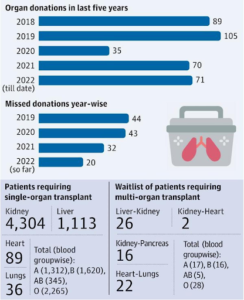In news– Recently, the Union Ministry of Health and Family Welfare has eased the norms related to organ transplants/donation.
Which norms have been relaxed?
- The clause that people beyond 65 years could not receive cadaver organ transplants had been removed.
- The government has decided to do away with a clause in the National Organ and Tissue Transplant Organisation (NOTTO) guidelines as the clause violates the Right to Life.
- Now an individual of any age can register for organ transplant.
- Also, earlier an organ recipient could register for a prospective transplant in domicile State.
- States like Gujarat had made it mandatory for registered patients to furnish a domicile certificate to be eligible for a transplant. In November 2022, the Gujarat High Court quashed the discriminatory policy of the State government.
- In line with the judgment, the Indian government has decided to do away with the domicile policy and all States have been intimated about this decision.
- A patient irrespective of domicile State can register in any other State for a transplant.
- The patient will be allotted a unique ID by NOTTO on registering which will get carried forward even if the patient changes multiple hospitals in different States.
- Apart from this, certain States like Kerala and Maharashtra have been charging fees ranging from ₹5,000 to ₹10,000 for registering organ transplant patients. The Health Ministry has intimated States to stop charging registration fees from patients.
- The Health Ministry is charting a ‘One Nation One Policy,’ for organ donation and transplantation.
- Cadaveric donation comprises organ donation—that is, taking organs (heart, lungs, kidneys, liver, pancreas) from brain dead people, as well as tissue donation, meaning taking tissues (skin, corneas, tendons, bone) from brain dead as well as heart dead people.
Organ donation in India-
- Organ donation in India is regulated by the Transplantation of Human Organs and Tissues Act, 1994.
- The law allows both deceased and living donors to donate their organs. It also identifies brain death as a form of death.
- According to data accessed from the Health Ministry, the number of organ transplants have increased by over three times from 4,990 in 2013 to 15,561 in 2022.
- Of the 15,561 transplants, a majority — 12,791 (82%) — are from live donors and 2,765 (18%) are from cadavers.
- Up to 11,423 of the 15,561 organ transplants are for the kidney, followed by liver, heart, lung, pancreas (24) and small bowel transplants.
- Most of these transplants occur in private hospitals, the numbers in government hospitals are relatively lower.

About NOTTO-
- The NOTTO is a National level organization set up under the Directorate General of Health Services, Ministry of Health and Family Welfare.
- It has following two divisions: i. National Human Organ and Tissue Removal and Storage Network and ii. National Biomaterial Centre.
- National Human Organ and Tissue Removal and Storage Networkhas been mandated as per the Transplantation of Human Organs (Amendment) Act 2011.
- The network will be established initially for Delhi and gradually expanded to include other States and Regions of the country. Thus, this division of the NOTTO is the nodal networking agency for Delhi and shall network for Procurement Allocation and Distribution of Organs and Tissues in Delhi.
- National Network division of NOTTO would function as apex centre for All India activities of coordination and networking for procurement and distribution of Organs and Tissues and registry of Organs and Tissues Donation and Transplantation in the country.
















